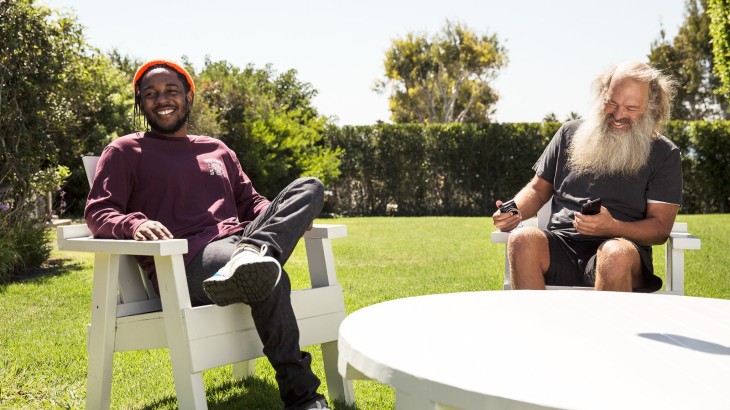One of the greatest producers of all time, Rick Rubin, has conducted an incredible interview with one of the greatest hip-hop artists of all time: Kendrick Lamar.
The pair are among the most influential and timeless people to ever contribute to hip-hop, in their own ways; Rubin, co-founder of Def Jam records and producer for The Beastie Boys, Eminem, Kanye West, Jay Z, Frank Ocean, Public Enemy and countless others within and outside of hip-hop. Lamar, one of the most vital lyricists of all time and certainly among the greatest living rappers today, has consistently delivered some of the most boundary-pushing and socially crucial music in hip-hop history.
The 49 minute interview is incredibly in-depth, delivering an insight into Lamar’s creative process that goes far deeper than any regular interview.
The To Pimp A Butterfly artist speaks about his meticulous process, from a vague idea through to writing lyrics and musical production; he talks about how he cannot and will not take back or contradict anything that he says on record, and that he can no longer feel a song where he’s not loving the music. “Sometimes I do come across those lines… where there is controversy,” he says. “But it came from some type of inspiration and I have to be vocal about it.” The only time he ever wants to change lyrics, he says, is when he feels like he should have gone deeper.
Going deeper into his process, he comments, “I don’t sleep,” explaining that he is involved in every single aspect of the production process. “I just have to be involved, from the snare to the hi-hat.”
He talks about how his biggest challenge as a lyricist is that he can cover any topic, but that he needs to always connect with the audience.
He talks about his upbringing and his earliest musical influences (Tupac, Biggie, Big Daddy Kane, E-40, Marvin Gaye, Isley brothers, etc.), and how they offered “different perspectives to life in general,” which he connected to as a young boy.
Interestingly, Lamar talks about how he realised he was a jazz musician before he ever heard jazz. Collaborator Terrace Martin once remarked that his choices of rhythms and instrumentation were jazz-inspired, and proceeded to introduce him to the music that was “in his DNA” the whole time.
“If I’m challenging myself in the studio I want to challenge you as well,” he says, speaking about how nobody expected the tone of To Pimp a Butterfly. Pushing further, Rubin asks if that musical continuation between his records can indicate what his future albums might sound like. “Me as a person is just knowing who I am, I grow, I’m like a chameleon,” he answers. “It’s a gift and a curse for me, but more so a gift, because it never contains me or puts me in a box.”
He talks about being a huge Prince fan too, and how that influenced him to always change his tone, emotion and style throughout his music – you cannot always tell that it’s Kendrick Lamar.
Rubin then asks him to compare his recording experience to his live performance. “I have to think about it, live it, know my movements,” he answers. “It’s a process, the same way I sit with mixes and mastering, is the same way I sit inside that rehearsal room.”
One of the most common comments about Lamar’s music is that it feels more like poetry than hip-hop, and indeed he confirms that he has written numerous songs as complete poems, and then had to find instrumentation to match.
They go on to talk about Alright, and Kendrick Lamar reveals that he was sitting on the beat for that track for six months. He had no lyrics, only a beat and a vague scat rhythm. “The beat sounds fun, but there was something else inside of those chords that Pharrell put down… It could be more of a statement.”
“It put pressure on me to challenge myself and to focus on something that can be a staple on hip-hop. Eventually I found the right words.”
“It comes when its supposed to come, and it works when it’s supposed to work,” quipped Rubin.
Rubin goes on to praise Lamar’s use of lyrics, comparing him to other rappers who are more about swag and personality than words. “I got my clarity from studying Eminem,” he answers. “The day I heard Marshall Mathers LP, what is he doing? How does that work? How’s his words cutting through the beat like that? His timing is impeccable. The way he falls off the beat.”
He talks about what he does to celebrate his successes, saying that he finds the thrill in getting back into the studio and going even further. “It’s not about the actual celebration for me, it’s about doing something fresh.”
When it comes to challenges and disappointments, he says that his biggest sacrifice has come from finding the balance between family and music – missing birthdays, missing people. “You can get lost so far into the music, you may forget the people you came up with, your family.”
He finally talks about where he’ll be heading for his next album. It’s still too soon to fully conceptualise, but he has ideas. “I have ideas, I have a certain approach. I wanna see what it manifests to, I wanna put all the paint on the wall and see where it goes – maybe you can help me with that,” he says to Rubin.
Watch below, and you can read more of the interview over at GQ, who were the genius coordinators of this amazing conversation.
Image: GQ Style

